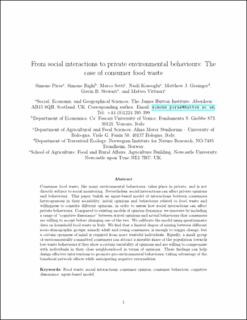| dc.contributor.author | Piras, Simone | |
| dc.contributor.author | Righi, Simone | |
| dc.contributor.author | Setti, Marco | |
| dc.contributor.author | Grainger, Matthew | |
| dc.contributor.author | Stewart, Gavin B. | |
| dc.contributor.author | Vittuari, Matteo | |
| dc.contributor.author | Koseoglu, Nazli | |
| dc.date.accessioned | 2023-01-10T12:45:14Z | |
| dc.date.available | 2023-01-10T12:45:14Z | |
| dc.date.created | 2021-10-12T11:36:38Z | |
| dc.date.issued | 2022 | |
| dc.identifier.issn | 0921-3449 | |
| dc.identifier.uri | https://hdl.handle.net/11250/3042332 | |
| dc.description.abstract | Consumer food waste, like many environmental behaviours, takes place in private, and is not directly subject to social monitoring. Nevertheless, social interactions can affect private opinions and behaviours. This paper builds an agent-based model of interactions between consumers heterogeneous in their sociability, their initial opinions and behaviours related to food waste, and their willingness to consider different opinions, in order to assess how social interactions can affect private behaviours. Compared to existing models of opinion dynamics, we innovate by including a range of “cognitive dissonance” between stated opinions and actual behaviours that consumers are willing to accept before changing one of the two. We calibrate the model using questionnaire data on household food waste in Italy. We find that a limited degree of mixing between different socio-demographic groups, namely adult and young consumers, is enough to trigger change, but a certain openness of mind is required from more wasteful individuals. Equally, a small group of environmentally committed consumers can attract a sizeable share of the population towards low-waste behaviours if they show a certain variability of opinions and are willing to compromise with individuals in their close neighbourhood in terms of opinions. These findings can help design effective interventions to promote pro-environmental behaviours, taking advantage of the beneficial network effects while anticipating negative externalities. Food waste Social interactions Consumer opinion Consumer behaviour Cognitive dissonance Agent-based model | en_US |
| dc.language.iso | eng | en_US |
| dc.rights | Attribution-NonCommercial-NoDerivatives 4.0 Internasjonal | * |
| dc.rights.uri | http://creativecommons.org/licenses/by-nc-nd/4.0/deed.no | * |
| dc.subject | Food waste | en_US |
| dc.subject | Social interactions | en_US |
| dc.subject | Consumer opinion | en_US |
| dc.subject | Consumer behaviour | en_US |
| dc.subject | Cognitive dissonance | en_US |
| dc.subject | Agent-based model | en_US |
| dc.title | From social interactions to private environmental behaviours: The case of consumer food waste | en_US |
| dc.title.alternative | From social interactions to private environmental behaviours: The case of consumer food waste | en_US |
| dc.type | Peer reviewed | en_US |
| dc.type | Journal article | en_US |
| dc.description.version | acceptedVersion | en_US |
| dc.rights.holder | © 2022 The Authors | en_US |
| dc.subject.nsi | VDP::Teknologi: 500::Miljøteknologi: 610 | en_US |
| dc.source.volume | 176 | en_US |
| dc.source.journal | Resources, Conservation and Recycling | en_US |
| dc.identifier.doi | 10.1016/j.resconrec.2021.105952 | |
| dc.identifier.cristin | 1945137 | |
| dc.relation.project | Andre: Scottish Government’s Rural and Environment Science and Anal | en_US |
| dc.relation.project | EU/Refresh “Resource Efficient Food and dRink for the Entire Su | en_US |
| dc.source.articlenumber | 105952 | en_US |
| cristin.ispublished | true | |
| cristin.fulltext | postprint | |
| cristin.qualitycode | 1 | |

